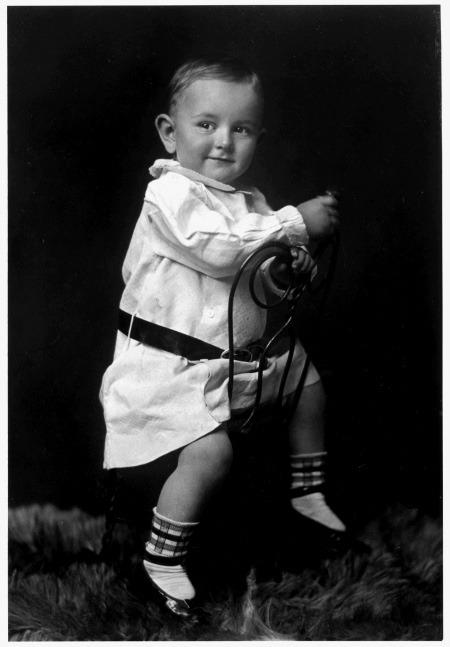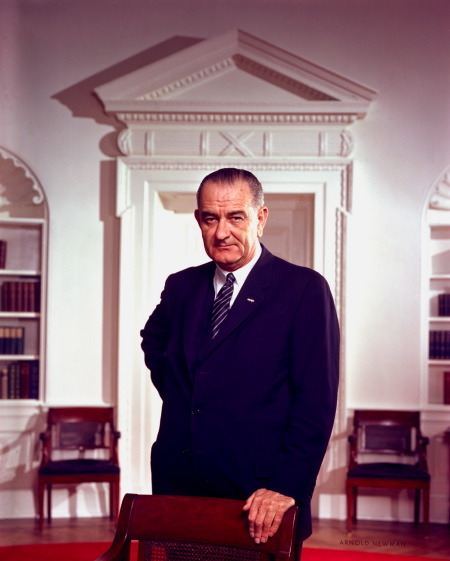08/27/2014 01:00 PM EDT


The boyhood that shaped LBJ
Lyndon Baines Johnson was born on August 27, 1908, in central Texas, not far from Johnson City, which his family had helped settle. Growing up, he felt the sting of rural poverty, working his way through Southwest Texas State Teachers College (now known as Texas State University), and learning compassion for the poverty and discrimination of others when he taught students of Mexican descent in Cotulla, Texas.
In 1937 he campaigned successfully for the House of Representatives on a New Deal platform, effectively aided by his wife, the former Claudia "Lady Bird" Taylor, whom he had married after a whirlwind courtship in 1934.
During World War II, Lyndon Johnson served briefly in the Navy as a lieutenant commander, receiving a Silver Star in the South Pacific. After six terms in the House, he was elected to the Senate in 1948. In 1953, he became the youngest Minority Leader in Senate history, and the following year, when the Democrats won control, Majority Leader. With rare legislative skill he obtained passage of a number of measures during the Eisenhower Administration. He became, by many accounts, the most powerful Majority Leader of the twentieth century.
In the 1960 campaign, Johnson, as John F. Kennedy's running mate, was elected Vice President. On November 22, 1963, when Kennedy was assassinated in Dallas, Lyndon Baines Johnson became the 36th President. Learn more about the events of that fateful day in our exhibit, Tragedy and Transition.
"Let us continue..."
Shortly after assuming the Presidency, Johnson used his legislative prowess to pass two bills that Kennedy had endorsed but was unable to get through Congress at the time of his death: a tax cut and a civil rights act. The latter, which would become the Civil Rights Act of 1964, became the first effective civil rights law since Reconstruction, outlawing segregation and discrimination throughout American society. Next he enacted his own agenda, urging the Nation "to build a great society, a place where the meaning of man's life matches the marvels of man's labor." In 1964, with Hubert Humphrey as his running mate, Johnson won the Presidency against Republican challenger, Barry Goldwater, garnering 61 percent of the vote and had the widest popular margin in American history—more than 15,000,000 votes.
The War Against Poverty, Public Broadcasting, Medicare, and more
President Johnson used his 1964 mandate to bring his vision for a Great Society to fruition in 1965, pushing forward a sweeping legislative agenda that would become one of the most ambitious and far-reaching in the nation's history. Congress, at times augmenting or amending Johnson's legislation, rapidly enacted his recommendations. As a result, his administration passed more than sixty education bills, initiated a wide-scale fight against poverty, saw federal support of the arts and humanities, championed urban renewal, environmental beautification and conservation, enabled development of depressed regions and pushed for control and prevention of crime and delinquency. Millions of elderly people were also given the means for proper medical care through the 1965 Medicare Amendment to the Social Security Act.
Johnson's Great Society also included the continued advancement of civil rights. He realized the passage of the Voting Rights Act of 1965, which removed poll taxes and tests that represented an obstacle to the ballot among many Americans of color, and the Civil Rights Act of 1968, preventing discrimination in housing sales and rentals. Additionally, he appointed the first African American cabinet member and U.S. Supreme Court Justice, Thurgood Marshall.
Mankind walks on the moon
Under Johnson, the U.S. also made impressive gains in its space program, which he had championed since its start. When three American astronauts successfully orbited the moon on Apollo 8 in December 1968, becoming the first to leave earth's orbit, Johnson congratulated them: "You've taken...all of us, all over the world, into a new era." The mission set the stage for the Apollo 11 mission seven months later, which saw men walk on the moon for the first time.
Nevertheless, two overriding crises had been gaining momentum since 1965. Despite the beginning of new antipoverty and anti-discrimination programs, unrest and rioting in black ghettos troubled the Nation. President Johnson steadily exerted his influence against segregation and on behalf of law and order, but there was no early solution.
The other crisis arose from the U.S. war in Vietnam, which the U.S. had committed to under Eisenhower and Kennedy. Despite Johnson's efforts to end Communist aggression by increasing U.S. troop involvement to leverage a peaceful settlement, fighting continued. Controversy and protests over the war—and Johnson—had become acute by the end of March 1968, when Johnson limited the bombing of North Vietnam in order to initiate peace negotiations. At the same time, he startled the world by withdrawing as a candidate for re-election so that he might devote his full efforts, unimpeded by politics, to the quest to strike an honorable peace.
"I want to be the President who helped to end war among the brothers of this earth."
When Johnson left office, peace talks were underway. He died suddenly of a heart attack at his Texas ranch on January 22, 1973. The day before his death, he had learned that peace was at hand in Vietnam.
Today Americans continue to feel the impact of Johnson's legislative legacy in nearly every aspect of American life.
Follow us at @AmericanNewsSer on Twitter
Facebook American-News-Service-dot-Org
No comments:
Post a Comment